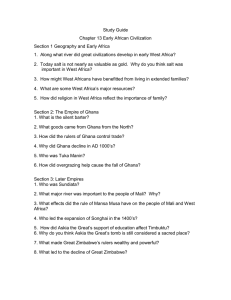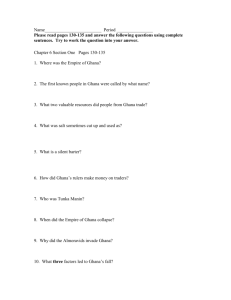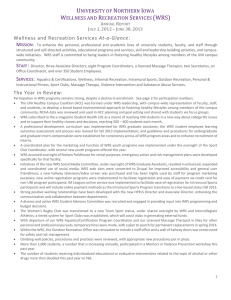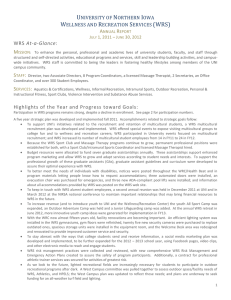WORKSHOP TO CHART THE WAY TOWARD THE IMPLEMENTATION OF
advertisement
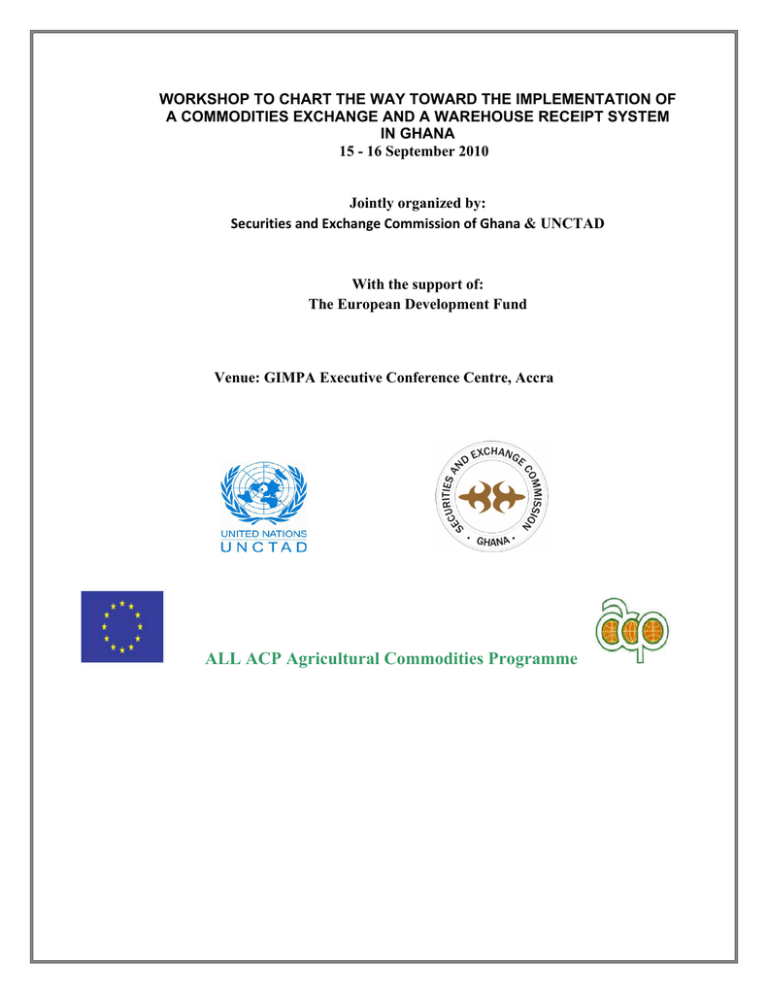
WORKSHOP TO CHART THE WAY TOWARD THE IMPLEMENTATION OF A COMMODITIES EXCHANGE AND A WAREHOUSE RECEIPT SYSTEM IN GHANA 15 - 16 September 2010 Jointly organized by: Securities and Exchange Commission of Ghana & UNCTAD With the support of: The European Development Fund Venue: GIMPA Executive Conference Centre, Accra ALL ACP Agricultural Commodities Programme BACKGROUND The Government of Ghana, the World Bank and the Department for International Development (DFID) in 2005 reached a credit agreement to support the restructuring of the Ghanaian financial sector under the Economic Management and Capacity Building Project (EMCB –FRS). The EMCB‐FRS project is to support the government of Ghana performs its role as a primary facilitator for economic development through a Financial Sector Reform programme which is aimed at strengthening the governance and competitiveness of the financial sector to strongly perform its intermediation role to support the real sector growth As part of this programme, the Securities and Exchange Commission (SEC) was assigned an implementation task to facilitate the establishment of a Commodities Exchange (CX) and Warehouse Receipt System (WRS) in Ghana. This assignment enjoyed the full commitment of the Government which stated in its 2007 Budget Statement in paragraph 1006 that “Feasibility studies into the viability of commodities market based on Warehouse Receipt System will be initiated by the Securities and Exchange Commission.” In pursuance of the aforementioned task, the Natural Resources Institute (NRI) of the United Kingdom was contracted by the Commission through an International Competitive Tender to undertake a feasibility study towards the establishment of a Commodities Exchange (CX) and Warehouse Receipt System (WRS) in Ghana. NRI concluded from the study that “establishing a Commodities Exchange and supporting Warehouse Receipt System (WRS)…” will help transform commodity marketing and finance in the country as well as significantly improve management of post‐harvest risks in some of the commodity sectors”. Three national workshops were then held in Accra, Kumasi and Takoradi to discuss with the findings of the study as well as to sensitize stakeholders of the proposed CX and WRS. The comments and concerns from stakeholders were incorporated in the final findings of the feasibility study. The SEC has since initiated steps at putting in place the necessary enabling legal and regulatory environment towards the establishment of the CX and WRS as per the recommendation of NRI. As part of efforts at actualizing the project objectives, the SEC has identified some key groups who need to be sensitized to help move the project forward. These groups include policy makers from the office of the president, ministries, farmer groups, insurance companies etc. The SEC is of the view that in order to let the sensitization have the requisite benefits, there is 2 need to hold separate workshops for the different identified groups. The foregoing proposal is targeted at persons who drive the policy direction of the nation. OBJECTIVES OF THE WORKSHOP The following objectives are expected to be achieved by the end of the workshop; 1. Sensitizing key policy makers on the need for a CX and WRS in Ghana’s developmental stage so as to promote economic growth and financial empowerment of farmers. 2. Developing a road map towards a speedy implementation of the project. 3. Sharing experiences and knowledge with experts from other African countries that have implemented a CX and WRS with the view to exploring lessons that could be learnt to avoid pitfalls and maximize benefits of a commodities market. 4. To help drive the policy direction for a CX and WRS in Ghana. TARGET GROUP The workshop is targeted at key government agencies which initiate, implement, evaluate, and monitor policies. At most one (1) policy expert would be invited from the following institutions to discuss the issues; 1. National Development Planning Commission 2. Policy Coordination, Monitoring and Evaluation Unit of the Office of the President 3. Ministry of Finance and Economic Planning 4. Ministry of Agriculture 5. Office of the Chief of Staff of the Office of the President 6. Ministry of Trade and Industry 7. Ministry of Transportation 8. Ministry of Local Government 9. Bank of Ghana 10. Ministry of Communication 11. Finance Committee, Parliament of Ghana 12. Ministry of Environment, Science and Technology 13. National Buffer Food Company of the Min. of Agriculture 14. Savanna Accelerated Development Authority 15. Ghana Grains Company 16. COCOBOD 17. Ghana Standards Board 18. National Insurance Commission 19. Financial Sector Division of Ministry of Finance and Economic Planning 20. Council of State 3 FUNDING AND RESOURCES PERSONS The United Nations Conference on Trade and Development (UNCTAD) has agreed to assist with funding of the workshop and also with the provision of technical assistance. The following resource persons will be attending: 1. Ambassador Kwabena Baah Duodu‐Senior Advisor to UNCTAD’s Secretary General and SUC’s Officer in Charge 2. Mrs. Santana‐Boado‐ UNCTAD’s Coordinator on COMEX 3. Dr. Gideon Onumah – Natural Resource Institute (NRI) ‐ University of Greenwich, UK. 4. Mr. Geoffrey Malekano‐ Capital Markets Commission, Tanzania 5. Mr. Adam Gross‐Bourse Africa, Botswana 6. Mr. Alex Rwego, Manager, Uganda Commodity Exchange PROPOSED WORKSHOP OPTION The following workshop is proposed; Day 1 will be dedicated to the sharing of experiences by other successful CX and WRSs. Day 2 will be to discuss the findings of the feasibility studies and major proposals following which a road map will be drawn. This is recommended since it would allow for a more effective and relaxed atmosphere for the realization of the objectives of the workshop. It would allow enough time for both formal and informal discussion as well as engender greater networking among the participants. PROPOSED DATES The workshop will be held on 15‐16 September 2010. 4 5


